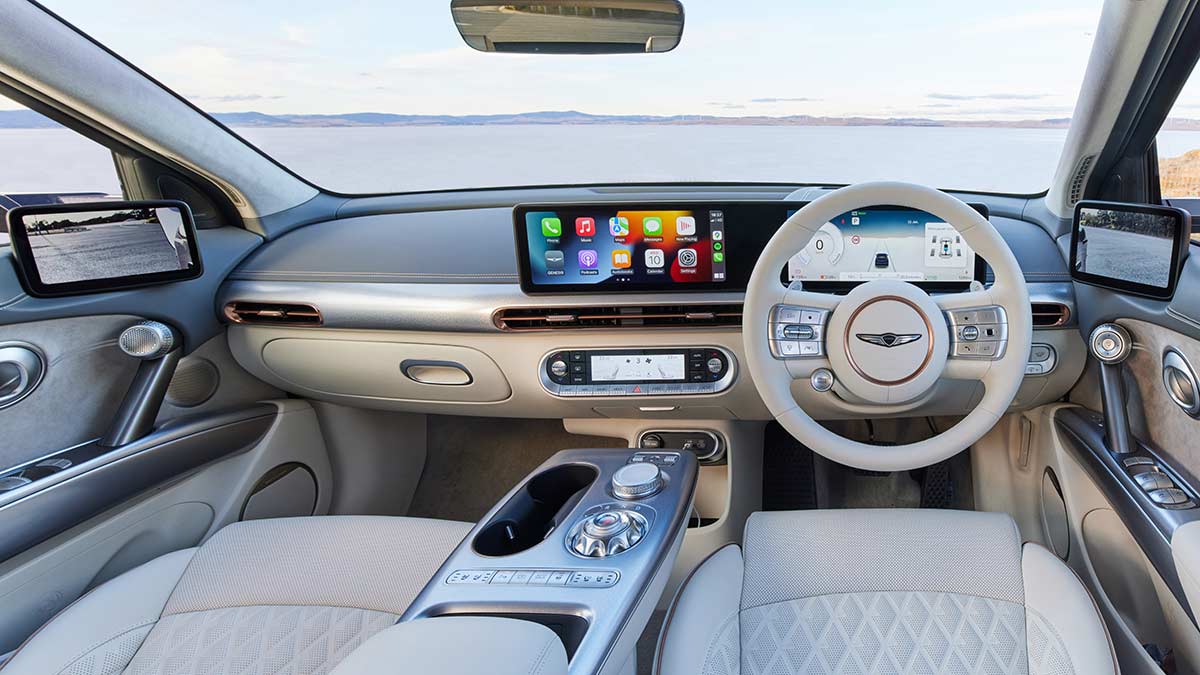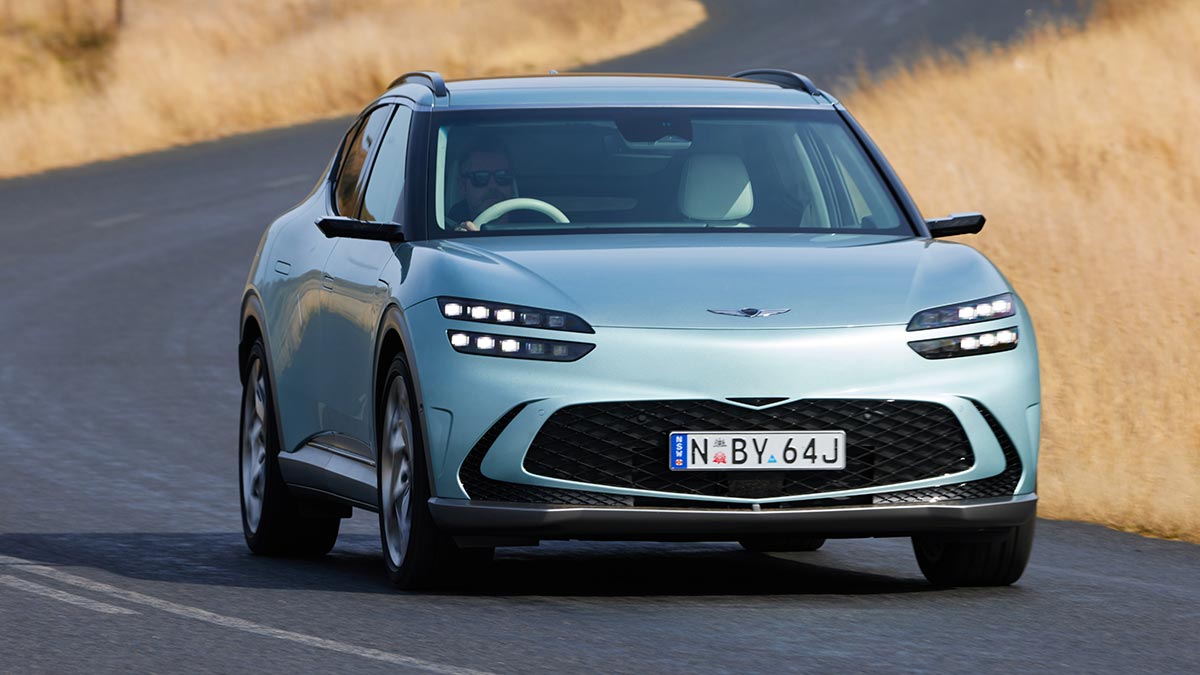The Xpeng G6 reads like a bona fide Tesla Model Y rival, but does that translate from the brochure to reality? Here we’re testing the more expensive G6 Long Range, which lives up to its name with a 570km claimed range.
Brand-aid: 2022 Genesis GV60 electric SUV first drive review

The GV60 is a mid-sized SUV with a huge challenge: to help boost the Genesis profile in Australia. But is it anything more than a blinged-up version of the Hyundai Ioniq 5 and Kia EV6?
Genesis has been kicking goals in 2022, and the arrival of the electric GV60 has already bolstered its stocks.
The prestige offshoot of Hyundai only went on sale in Australia in 2019 but last year managed to sell 734 vehicles. The company has nearly achieved that figure already in 2022, and with more than 100 examples of the GV60 already pre-sold, is almost certain to post record sales.
The GV60 is based on the “Electric Global Modular Platform” that underpins the Hyundai Ioniq5 and Kia EV6.
It is more than just a fancy clone of those mainstream electric vehicles, though, with the unique styling and luxury interior backed by substantially more power from the electric motors in the performance version.
The performance is so high that Genesis Australia head, Connal Yan, says some buyers have deliberately chosen to take the base model with a 'saner' level of acceleration.
On the other hand, supply of the Genesis GV60 is limited in the immediate future. Genesis has only secured 150 vehicles in its first batch and buyers who sign up now will be facing at least a six-month wait for the cars.
On this page
- How much does the Genesis GV60 cost?
- Is the Genesis GV60 safe?
- What's the Genesis GV60 like inside?
- What's under the Genesis GV60's bonnet?
- Is the Genesis GV60 efficient?
- How does the Genesis GV60 drive?
- Should I buy one?
How much does the Genesis GV60 cost?
Landing a Genesis GV60 AWD in your drive will cost $103,700 plus on-roads, or around $113,000 driveaway.
The top-tier GV60 Performance AWD adds $7,000 to the list price.
In both cases, the GV60 is bundled with five years’ complimentary servicing and the owner’s choice of a five-year ChargeFox subscription or Genesis will pay for the cost of buying and installing a charger in your home.
Matte paint is a $2,000 option on the Genesis GV60 Performance AWD.
Tesla’s Model Y Performance AWD at $101,612 plus on-roads is the obvious alternative to the GV60.
Unlike the Genesis, Tesla doesn’t have nearly the supply constraints so should well and truly outperform it in terms of sales volume.
Is the Genesis GV60 safe?
Owners won’t fault the Genesis GV60 for its safety credentials.
ANCAP has assessed the vehicle’s adult and child occupant protection at 89 per cent, vulnerable road user safety is 63 per cent and the safety assist features are rated at 88 per cent.
A centre airbag to protect the front occupants’ heads in a side-on crash is standard, as are front, side and curtain airbags and a driver’s kneebag.
Safety software includes autonomous emergency braking, including cross-traffic assist when crossing intersections, adaptive cruise control with traffic sign recognition, blind-spot assist, driver attention assist and automated parking.
What’s the Genesis GV60 like inside?
Quality isn’t an issue in the GV60. There are some unique touches, like the spherical gear selector that initially appears as a crystal “mood light” when owners enter the car, then flips to display the rotary gear selector when the car is started.
Nappa leather upholstery is standard and the seat paddling is plush yet supportive. Naturally, both front pews are powered, and the driver has a massage function.
A pair of 12.3-inch screens cater for the infotainment panel and driver’s display. Wireless phone charging is standard, backed by satellite navigation (with free updates for 10 years) and a 17-speaker Band & Olufsen sound system.
The head-up display is classy, if not quite the class of the Mercedes-Benz system.
The rear seats are more than acceptable for a vehicle of this provenance, but don’t sit in the middle, given the outboard pair are heated (as is the steering wheel).
The Performance AWD is little different to its cheaper brethren inside. Alloy interior trim replaces the copper-look finish, along with alloy pedals and a boost button on the steering wheel (more on that later).
What’s under the Genesis GV60’s bonnet?
A pair of electric motors are common to both Genesis GV60 variants. The AWD version uses a 160kW/350Nm front motor, supplemented by a 74kW/255Nm rear motor.
The combined output of 235kW/605Nm is impressive, though the Kia EV6 can match it for appreciably less money (and less interior style).
Move up to the GV60 Performance AWD and things get far more interesting.
The combined outputs are 360kW and 700Nm, courtesy of 160kW/350Nm motors front and rear.
The caveat is that can only be achieved in 10-second bursts by depressing the boost button on the steering wheel. Otherwise, the Performance AWD has a claimed 320kW/605Nm.
The difference is instantly evident, as shown by a 4.0-second 100km/h time in boost mode, against a 4.6-second run without using that button.
Is the Genesis GV60 efficient?
A 77.4kW battery powers the electric motors in the Genesis GV60.
Genesis quotes a 470km range for the GV60 AWD, dropping only marginally 466km for the GV60 Performance AWD.
That equates to 18.8kWh/100km and 19.1kWh/100km respectively.
The Genesis GV60 is capable of DC charging at up to 350kW. Don’t expect to achieve that over the course of the recommended 10-80 per cent charge. The software will regulate the uptake of ions depending on ambient temperature and battery chemistry, essentially to maximise longevity of the cells.
In an ideal world, Genesis says fast-charging can occur in as little at 18 minutes on a 350kW charger, rising to 73 minutes on a 50kW device.
Recharge at home using an 11kW wallbox and the time expands to near enough to eight hours.
How does the Genesis GV60 drive?
Adaptive dampers make the GV60 Performance AWD the pick of the GV60 pair.
There is an appreciable difference as drivers cycle through the modes, though even in the sport setting it is still more biased to comfort than cornering prowess.
Acceleration is frighteningly quick, largely because of the absence of road noise intrusion. Without that aural impression, drivers need to pay close attention to the head-up display to ensure they’re not exceeding the posted limit.
The GV60 is more than a straight-line performer, though, with enough chassis stiffness and suspension control to provide eye-opening corner performance. In that regard, it is more of a high-riding hatch than a traditional SUV.
It is worth remembering that this is a 2.2-tonne vehicle and the mass ultimately limits just how hard you can push the Genesis SUV through a bend before the mechanicals will start to protest.
Steering feedback isn’t sterling, but the Michelin tyres provide impressive grip and mask the slight vagueness through the wheel.
The camera-based side "mirrors" project onto screens mounted at the front of doors. It takes some time to adapt to them: I repeatedly found myself glancing at the camera.
Should I buy one?
If you’ve already put your hand up for a Genesis GV60, you won’t be disappointed.
The GV60 occupies a niche that other conventional prestige brands have yet to occupy. If Genesis Australia had access to 1,500 cars, they’d probably sell them all.
That said, as a prospective owner, you'll want to wait a few months to see how the Hyundai Ioniq 5 and Kia EV6 GT stack up before looking for a Genesis dealership (and those “studios” as Genesis refers to them are few and far between).
One of the advantages of not being able to make an impulse buy is being able to sit back and see what else is on its way. Given the increasing acceleration of EV arrivals, expect there to be a few.
The information provided is general advice only. Before making any decisions please consider your own circumstances and the Product Disclosure Statement and Target Market Determinations. For copies, visit racv.com.au. As distributor, RACV Insurance Services Pty Ltd AFS Licence No. 230039 receives commission for each policy sold or renewed. Product(s) issued by Insurance Manufacturers of Australia ABN 93 004 208 084 AFS Licence No. 227678.











